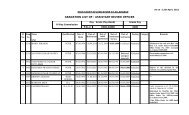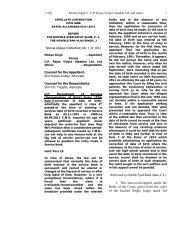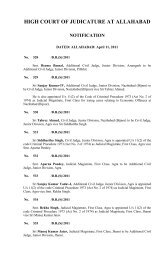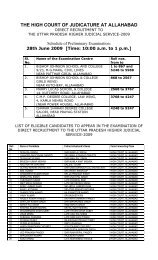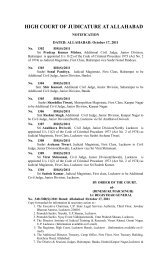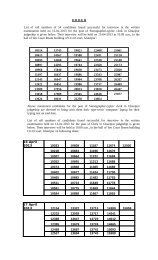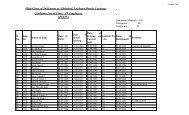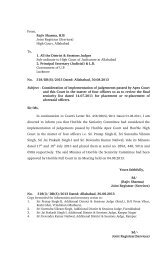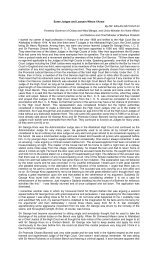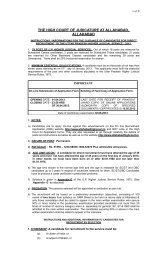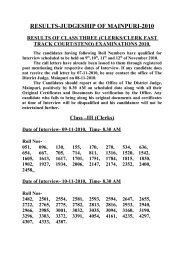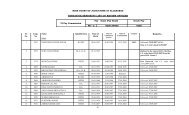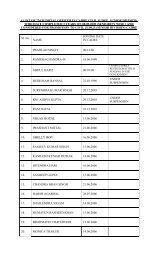Nov - High Court of Judicature at Allahabad
Nov - High Court of Judicature at Allahabad
Nov - High Court of Judicature at Allahabad
Create successful ePaper yourself
Turn your PDF publications into a flip-book with our unique Google optimized e-Paper software.
1030 INDIAN LAW REPORTS ALLAHABAD SERIES [2009<br />
the Act have to be so interpreted as to<br />
effectu<strong>at</strong>e the said object.<br />
(ii) An insurer is entitled to raise a<br />
defence in a claim petition filed under<br />
Section 163-A or Section 166 <strong>of</strong> the Motor<br />
Vehicles Act, 1988, inter alia, in terms <strong>of</strong><br />
Section 149(2)(a)(ii) <strong>of</strong> the said Act.<br />
(iii) The breach <strong>of</strong> policy condition e.g.,<br />
disqualific<strong>at</strong>ion <strong>of</strong> the driver or invalid<br />
driving licence <strong>of</strong> the driver, as contained<br />
in sub-section (2)(a)(ii) <strong>of</strong> Section 149,<br />
has to be proved to have been committed<br />
by the insured for avoiding liability by the<br />
insurer. Mere absence, fake or invalid<br />
driving licence or disqualific<strong>at</strong>ion <strong>of</strong> the<br />
driver for driving <strong>at</strong> the relevant time, are<br />
not in themselves defences available to<br />
the insurer against either the insured or<br />
the third parties. To avoid its liability<br />
towards the insured, the insurer has to<br />
prove th<strong>at</strong> the insured was guilty <strong>of</strong><br />
negligence and failed to exercise<br />
reasonable care in the m<strong>at</strong>ter <strong>of</strong> fulfilling<br />
the condition <strong>of</strong> the policy regarding use<br />
<strong>of</strong> vehicles by a duly licensed driver or<br />
one who was not disqualified to drive <strong>at</strong><br />
the relevant time.<br />
(iv) Insurance Companies, however, with<br />
a view to avoid their liability must not<br />
only establish the available defence(s)<br />
raised in the said proceedings but must<br />
also establish 'breach' on the part <strong>of</strong> the<br />
owner <strong>of</strong> the vehicle; the burden <strong>of</strong> pro<strong>of</strong><br />
wherefor would be on them.<br />
(v) The <strong>Court</strong> cannot lay down any<br />
criteria as to how the said burden would<br />
be discharged, inasmuch as the same<br />
would depend upon the facts and<br />
circumstances <strong>of</strong> each case.<br />
(vi) Even where the insurer is able to<br />
prove breach on the part <strong>of</strong> the insured<br />
concerning the policy condition regarding<br />
holding <strong>of</strong> a valid licence by the driver or<br />
his qualific<strong>at</strong>ion to drive during the<br />
relevant period, the insurer would not be<br />
allowed to avoid its liability towards the<br />
insured unless the said breach or<br />
breaches on the condition <strong>of</strong> driving<br />
licence is/are so fundamental as are found<br />
to have contributed to the cause <strong>of</strong> the<br />
accident. The Tribunals in interpreting<br />
the policy conditions would apply "the<br />
rule <strong>of</strong> main purpose" and the concept <strong>of</strong><br />
"fundamental breach" to allow defences<br />
available to the insurer under Section<br />
149(2) <strong>of</strong> the Act.<br />
(vii) The question, as to whether the<br />
owner has taken reasonable care to find<br />
out as to whether the driving licence<br />
produced by the driver, (a fake one or<br />
otherwise), does not fulfil the<br />
requirements <strong>of</strong> law or not will have to be<br />
determined in each case.<br />
(viii) If a vehicle <strong>at</strong> the time <strong>of</strong> accident<br />
was driven by a person having a learner's<br />
licence, the insurance Companies would<br />
be liable to s<strong>at</strong>isfy the decree.<br />
(ix) The claims tribunal constituted under<br />
Section 165 read with Section 168 is<br />
empowered to adjudic<strong>at</strong>e all claims in<br />
respect <strong>of</strong> the accidents involving de<strong>at</strong>h or<br />
<strong>of</strong> bodily injury or damage to property <strong>of</strong><br />
third party arising in use <strong>of</strong> motor vehicle.<br />
The said power <strong>of</strong> the tribunal is not<br />
restricted to decide the claims inter se<br />
between claimant or claimants on one<br />
side and insured, insurer and driver on<br />
the other. In the course <strong>of</strong> adjudic<strong>at</strong>ing<br />
the claim for compens<strong>at</strong>ion and to decide<br />
the availability <strong>of</strong> defence or defences to<br />
the insurer, the Tribunal has necessarily<br />
the power and jurisdiction to decide<br />
disputes inter se between the insurer and<br />
the insured. The decision rendered on the<br />
claims and disputes inter se between the<br />
insurer and insured in the course <strong>of</strong><br />
adjudic<strong>at</strong>ion <strong>of</strong> claim for compens<strong>at</strong>ion by<br />
the claimants and the award made<br />
thereon is enforceable and executable in



